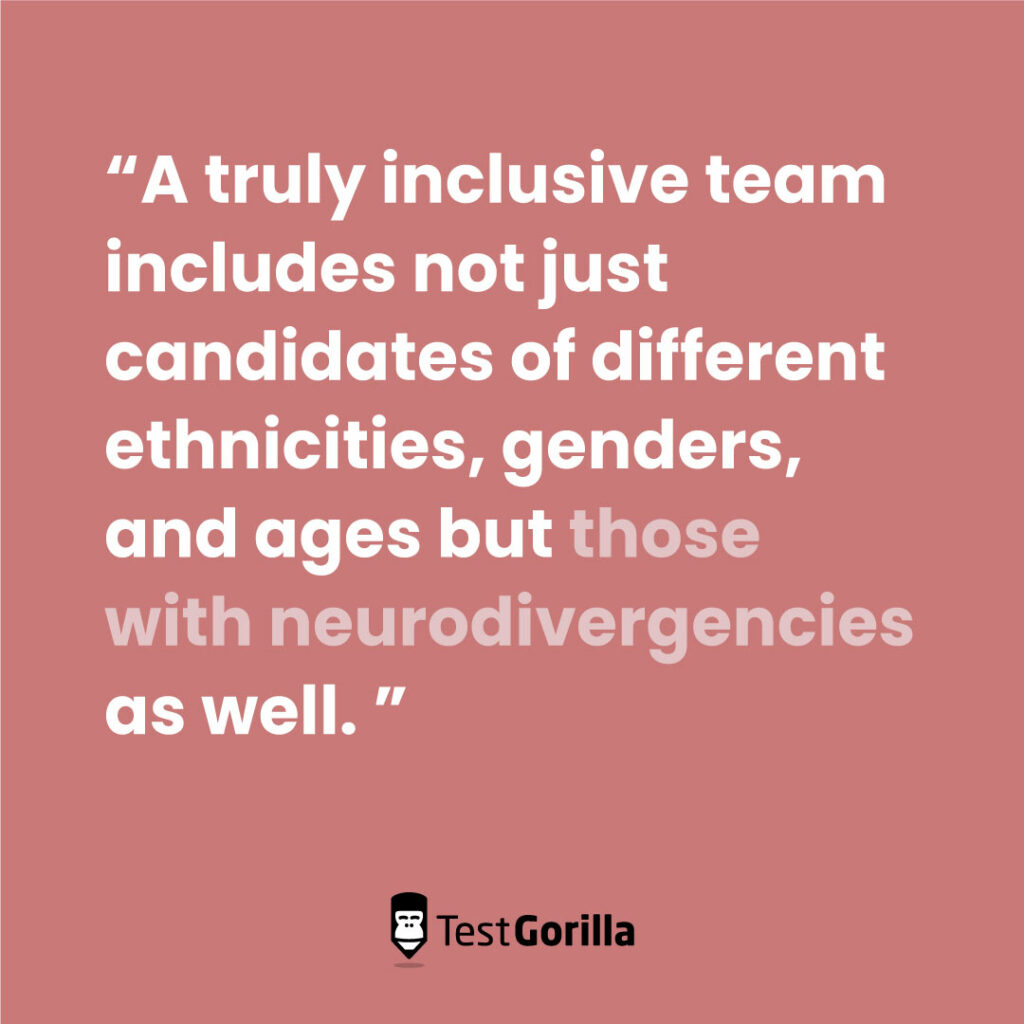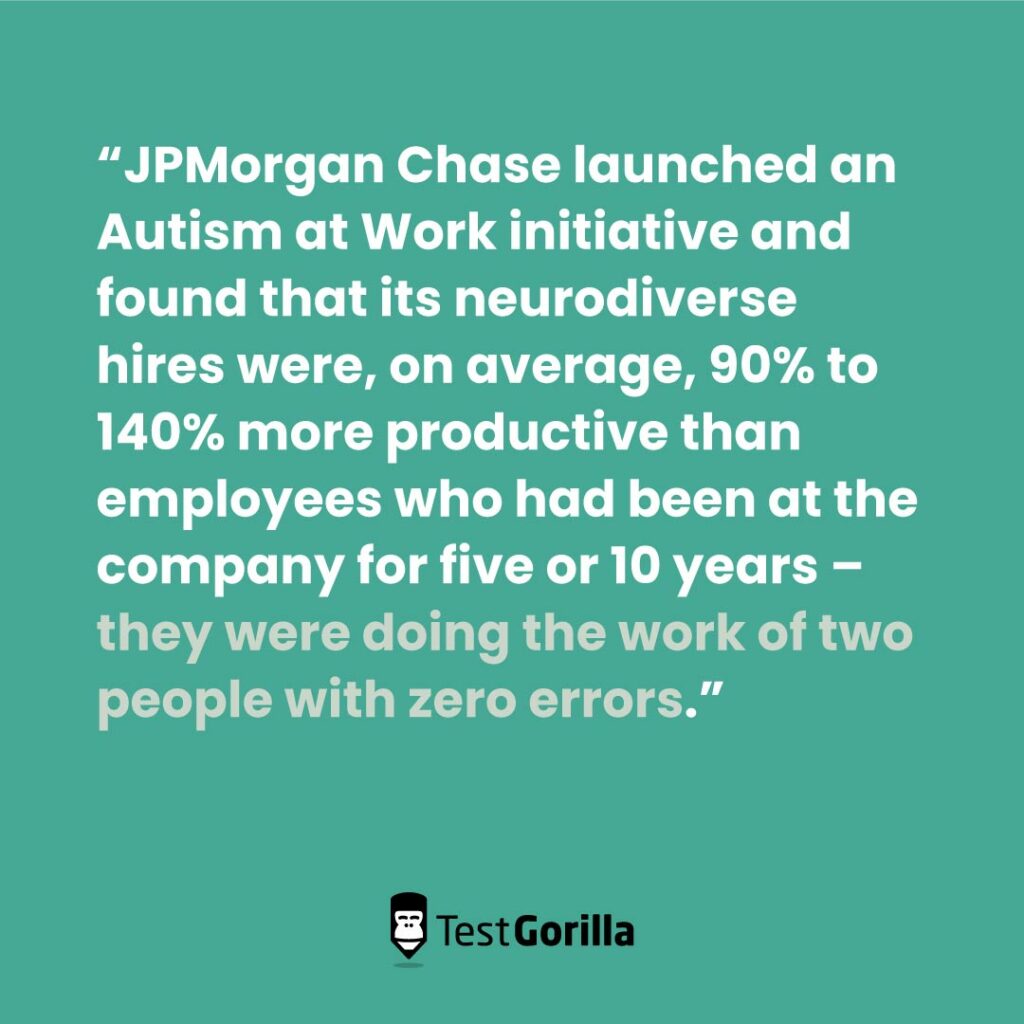Companies like IBM, Microsoft, and JPMorgan are actively hiring neurodivergent (ND) candidates, not only to boost diversity but also to harness the unique skills ND candidates have.¹
Neurodiversity covers many conditions, such as attention-deficit hyperactivity disorder, autism, dyslexia, dyspraxia, and others.² Neurodiverse individuals tend to excel at deep work because of a high attention to detail, but they also have “visual skills, ability to memorize, creativity, intense empathy, loyalty, and unique perspectives,” says Elizabeth Thomas, co-founder and CEO of Phonologix Health Solutions, an online speech therapy platform.³
A lack of awareness and education around neurodivergence is a top reason for ND individuals to be excluded from the workforce. The unemployment rate for neurodivergent individuals is as high as 30-40%, which is eight times the rate for people without disabilities.⁴
A truly inclusive team includes not just candidates of different ethnicities, genders, and ages but those with neurodivergencies as well. To make your hiring practices more inclusive and recruit top talent across the board, train your team and create a suitable infrastructure for everyone, especially neurodivergent employees, to thrive.
Table of contents
- Educate your team about neurodivergence
- Redesign your interview process to suit candidates’ needs
- Use skills testing with reasonable accommodations to find the best candidates
- Provide the right infrastructure for neurodivergent candidates to thrive
- Find candidates’ strongest skills to reap the most benefits
- Sources
Educate your team about neurodivergence
The term “neurodivergent” covers a broad swathe of things. When it comes to hiring, an awareness of neurodivergencies and their challenges can help your team avoid accidental discrimination to create a more inclusive hiring experience. But some criteria used in interviews can be discriminatory against ND candidates.
For example, some neurodivergent candidates might experience difficulty maintaining eye contact, the inability to make small talk, sensitivity to light and noise, or difficulty planning and organizing. These are traits that some may see as rudeness or disinterest. Inclusive hiring practices accommodate characteristics like these.
Mini-courses may help employees learn the different types of neurodivergence, so your team can accommodate ND needs during hiring. These courses can also help your team learn about the strengths and limitations of ND employees. Then you can look for ways to work with these traits instead of against them.
Kathryn Boudreau, operations manager at CallerSmart, shares the topics of some of the courses the company offers to its employees:
What is neurodiversity (ADHD, dyslexia, autism)?
Potential strengths and weaknesses of neurodivergence
How to communicate with different communication styles
What are microaggressions, and how do they affect neurodivergent employees?
In their discussions on communication styles, CallerSmart’s team explains how the use of repetitive or rigid language and fidgeting is typical in ADHD. Training includes how to recognize differences in communication styles and access or engage the situation. And in the microaggressions course, employees learn how to avoid letting stereotypes pervade their everyday language.
With adequate training, managers can develop empathy for ND employees and tweak their processes and communication rules to accommodate these employees. For instance, they might offer more options for interviews, like asynchronous video, instead of the standard face-to-face or video interview.
Redesign your interview process to suit candidates’ needs
Neurodiversity consultant Gopika Kapoor says the standard interview process puts ND candidates at a disadvantage. Common hiring scenarios, like group interviewers or abstract questions like “Where do you see yourself in 5/10/15 years?” can create extreme anxiety for some candidates. For a pleasant interview experience, consider the interview process from both neurodivergent and neurotypical perspectives.
Boudreau shares several tips to design a good interview experience for not just your ND candidates but all candidates:
Send interview questions in advance so that candidates can prepare
Offer the choice of a face-to-face or video interview
Avoid open-ended questions, like, “Tell me about yourself”
Ask specific and closed-ended questions, such as, “Please summarize your work experience from the last four years. Who did you work for, and what were your main job duties?”
Ask specific questions about work experience, like, “What data analysis and research skills did you use in your last job?”
Be patient and clarify your questions if a candidate has trouble
Avoid questions regarding disability, age, gender, or any other subject unrelated to the job
For better interview experiences overall, Shreya Sehgal, people and culture generalist at High Tide Co., also suggests:
Give candidates the option of video on or off
Ask simple, clear questions
Use automated captions in video interviews or type out questions in chat
Multiple options, like video on or off and the use of captions, ensure candidates are more comfortable during an interview, while clarity in questions keeps candidates from veering off-topic, too.
Use skills testing with reasonable accommodations to find the best candidates
Skills tests help all candidates showcase their competence for a role, regardless of neurodivergence, disability, cultural background, or education. But your skills tests need to be designed for inclusivity too. For instance, a candidate with dyslexia may require additional time to complete reading- and writing-related tasks. The best type of test for them might be one that requires them to create actual sketches or prototypes rather than one with lots of writing (“Describe what you think of X design”).
Inform candidates in advance that you’re going to conduct a skills test, so they can request accommodation if required. In most countries, reasonable accommodations for skills tests are a legal requirement. Some examples of reasonable accommodations include:
Extra breaks for someone with autism
Extra time on tests for someone with dyslexia
An alternate test format, such as an oral test for someone with dysgraphia
If you’re administering a test online, make sure your testing software allows candidates to request accommodation prior to the test. For more information on this, you can read TestGorilla’s guide to making special accommodations when using skills tests.
Provide the right infrastructure for neurodivergent candidates to thrive
Once you’ve adjusted your hiring process, you’ve got a prime opportunity to make your workspace more inclusive as well. For instance, candidates with autism might face problems with noise and bright lighting, while those with dyslexia may need more time for projects that require reading and writing. Small adjustments like quiet spaces and assistive technology can make a big difference in their productivity.
Boudreau suggests providing assistive technologies for reading and writing, such as:
Speech-to-text software like Windows 10 speech recognition and Gboard
Transcription software like Otter.ai
Text-to-speech software like ClaroRead
These tools make it easier for employees to quickly complete tasks like reading and writing emails, documents, and notes.
Thomas recommends adjusting the work environment as well. That could include:
Noise-canceling headphones
Quiet spaces
Flexible work, like remote or hybrid options
For some ND candidates to feel reassured at the office, Boudreau suggests allowing caretakers or family members to join the employee during the nurturing or training period.
Kapoor also advises partnering with organizations that specialize in specific types of neurodivergence to make the process of onboarding and working with ND candidates easier.
Find candidates’ strongest skills to reap the most benefits
When your hiring practices don’t consider the needs of any group of people, you miss out on good candidates. And neurodivergent folks are some of the most productive workers.
JPMorgan Chase launched an Autism at Work initiative and found that its neurodiverse hires were, on average, 90% to 140% more productive than employees who had been at the company for five or 10 years – they were doing the work of two people with zero errors.
However, Susanne Marie Bruyere, professor of disability studies at Cornell University, warned companies not to take the numbers at face value. She said, “Neurodiverse employees don’t have superpowers. [Their success] is a result of careful job matching, employees’ natural strengths, managers who help them use them, and organizations to support them.”
While ND candidates have strengths their peers might not, it’s important to match the right candidates to the right jobs for the best results. With inclusive hiring practices and skills assessments, you’ll be primed to scoop up the top candidates in any field. This is especially important in a candidate’s market.
Use skill tests from TestGorilla’s test library to find the right jobs for all candidates. Sign up for a free trial of TestGorilla to take a look at our tests, or check out our other blogs to find out how skills-based hiring can help you hire fairly and efficiently.
Sources
Ossola, Alexanda. ‘Neurodiverse Applicanst are revolutionizing the hiring process’, QUARTZ (March 2021): https://qz.com/work/1981466/neurodiverse-applicants-are-revolutionizing-the-hiring-process
Cleveland Clinic, ‘Neurodivergent: What it is, Symptoms and Types’: https://my.clevelandclinic.org/health/symptoms/23154-neurodivergent
Phonologix homepage: https://phonologixtherapy.com/
The Center for Neurodiversity & Employment Innovation: https://entrepreneurship.uconn.edu/neurodiversitycenter/
Related posts
Hire the best candidates with TestGorilla
Create pre-employment assessments in minutes to screen candidates, save time, and hire the best talent.
Latest posts
The best advice in pre-employment testing, in your inbox.
No spam. Unsubscribe at any time.

Hire the best. No bias. No stress.
Our screening tests identify the best candidates and make your hiring decisions faster, easier, and bias-free.
Free resources
This checklist covers key features you should look for when choosing a skills testing platform
This resource will help you develop an onboarding checklist for new hires.
How to assess your candidates' attention to detail.
Learn how to get human resources certified through HRCI or SHRM.
Learn how you can improve the level of talent at your company.
Learn how CapitalT reduced hiring bias with online skills assessments.
Learn how to make the resume process more efficient and more effective.
Improve your hiring strategy with these 7 critical recruitment metrics.
Learn how Sukhi decreased time spent reviewing resumes by 83%!
Hire more efficiently with these hacks that 99% of recruiters aren't using.
Make a business case for diversity and inclusion initiatives with this data.





















